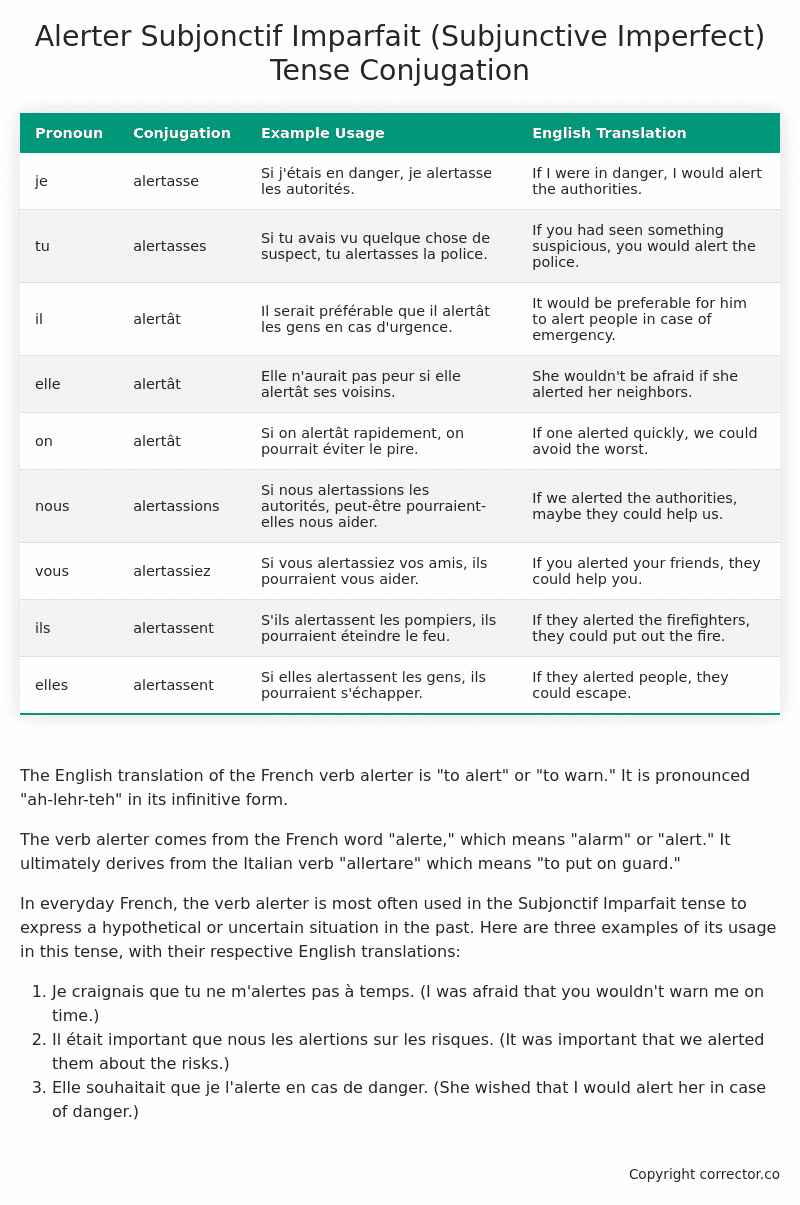Subjonctif Imparfait (Subjunctive Imperfect) Tense Conjugation of the French Verb alerter
Introduction to the verb alerter
The English translation of the French verb alerter is “to alert” or “to warn.” It is pronounced “ah-lehr-teh” in its infinitive form.
The verb alerter comes from the French word “alerte,” which means “alarm” or “alert.” It ultimately derives from the Italian verb “allertare” which means “to put on guard.”
In everyday French, the verb alerter is most often used in the Subjonctif Imparfait tense to express a hypothetical or uncertain situation in the past. Here are three examples of its usage in this tense, with their respective English translations:
- Je craignais que tu ne m’alertes pas à temps. (I was afraid that you wouldn’t warn me on time.)
- Il était important que nous les alertions sur les risques. (It was important that we alerted them about the risks.)
- Elle souhaitait que je l’alerte en cas de danger. (She wished that I would alert her in case of danger.)
Table of the Subjonctif Imparfait (Subjunctive Imperfect) Tense Conjugation of alerter
| Pronoun | Conjugation | Example Usage | English Translation |
|---|---|---|---|
| je | alertasse | Si j’étais en danger, je alertasse les autorités. | If I were in danger, I would alert the authorities. |
| tu | alertasses | Si tu avais vu quelque chose de suspect, tu alertasses la police. | If you had seen something suspicious, you would alert the police. |
| il | alertât | Il serait préférable que il alertât les gens en cas d’urgence. | It would be preferable for him to alert people in case of emergency. |
| elle | alertât | Elle n’aurait pas peur si elle alertât ses voisins. | She wouldn’t be afraid if she alerted her neighbors. |
| on | alertât | Si on alertât rapidement, on pourrait éviter le pire. | If one alerted quickly, we could avoid the worst. |
| nous | alertassions | Si nous alertassions les autorités, peut-être pourraient-elles nous aider. | If we alerted the authorities, maybe they could help us. |
| vous | alertassiez | Si vous alertassiez vos amis, ils pourraient vous aider. | If you alerted your friends, they could help you. |
| ils | alertassent | S’ils alertassent les pompiers, ils pourraient éteindre le feu. | If they alerted the firefighters, they could put out the fire. |
| elles | alertassent | Si elles alertassent les gens, ils pourraient s’échapper. | If they alerted people, they could escape. |
Other Conjugations for Alerter.
Le Present (Present Tense) Conjugation of the French Verb alerter
Imparfait (Imperfect) Tense Conjugation of the French Verb alerter
Passé Simple (Simple Past) Tense Conjugation of the French Verb alerter
Passé Composé (Present Perfect) Tense Conjugation of the French Verb alerter
Futur Simple (Simple Future) Tense Conjugation of the French Verb alerter
Futur Proche (Near Future) Tense Conjugation of the French Verb alerter
Plus-que-parfait (Pluperfect) Tense Conjugation of the French Verb alerter
Passé Antérieur (Past Anterior) Tense Conjugation of the French Verb alerter
Futur Antérieur (Future Anterior) Tense Conjugation of the French Verb alerter
Subjonctif Présent (Subjunctive Present) Tense Conjugation of the French Verb alerter
Subjonctif Passé (Subjunctive Past) Tense Conjugation of the French Verb alerter
Subjonctif Imparfait (Subjunctive Imperfect) Tense Conjugation of the French Verb alerter (this article)
Subjonctif Plus-que-parfait (Subjunctive Pluperfect) Tense Conjugation of the French Verb alerter
Conditionnel Présent (Conditional Present) Tense Conjugation of the French Verb alerter
Conditionnel Passé (Conditional Past) Tense Conjugation of the French Verb alerter
L’impératif Présent (Imperative Present) Tense Conjugation of the French Verb alerter
L’infinitif Présent (Infinitive Present) Tense Conjugation of the French Verb alerter
Struggling with French verbs or the language in general? Why not use our free French Grammar Checker – no registration required!
Get a FREE Download Study Sheet of this Conjugation 🔥
Simply right click the image below, click “save image” and get your free reference for the alerter Subjonctif Imparfait tense conjugation!

Alerter – About the French Subjonctif Imparfait (Subjunctive Imperfect) Tense
Formation
Common Everyday Usage Patterns
Interactions with Other Tenses
Subjonctif Présent
Indicatif Passé Composé
Conditional
Conditional Perfect
Summary
I hope you enjoyed this article on the verb alerter. Still in a learning mood? Check out another TOTALLY random French verb conjugation!


